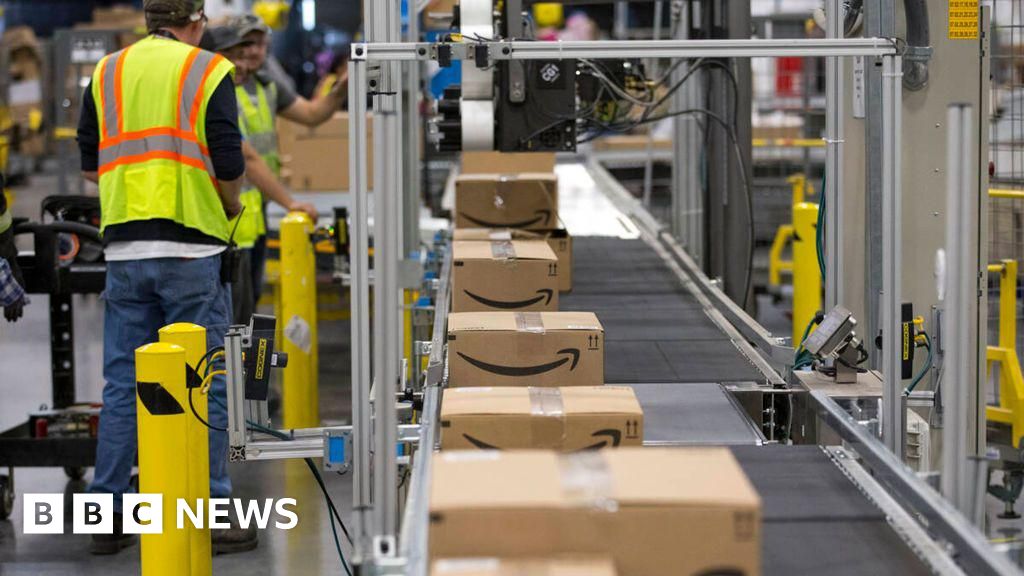ARTICLE AD BOX
By Michael Race & Lora Jones
Business reporters, BBC News
Image source, Getty Images
Image caption,Will workers return to daily commuting as they did before the pandemic?
Many workers are set to return to the office this week after work-from-home guidance was ditched in England.
But while some staff say they cannot wait to go back in, others are disappointed they can't continue working from home full time.
It comes as coronavirus infection rates in the country remain high, and unions have raised concerns over safety.
However, city centre businesses are hoping for a much needed boost as commuters return to their offices.
According to a Centre for Cities report published on Monday, Covid-19 has cost businesses in city and large town centres more than a third (35%) of their potential takings and shut down thousands since March 2020.
Some employers have argued working from the office is more productive, with the boss of bank Goldman Sachs previously calling remote working an "aberration".
But many believe flexible working is here to stay. An exclusive BBC survey found 70% of 1,684 people polled do not believe workers will return to the office full-time when the pandemic subsides.
The BBC spoke to workers about how they felt about going back, and whether things would be different this time around.
'I enjoy the office much more than I thought'
Image source, IngridTemmerman
Ingrid Temmerman, an executive assistant at Imperial College London, worked from home during the first coronavirus lockdown.
According to latest official figures, some 37% of adults worked from home in 2020, with workers living in London the most likely to do so.
However, Ingrid has since changed to a role which meant she was required to work full-time in the office, until the government issued its work-from-home guidance.
She will be returning to the office on Monday, but said she was "mindful not to change back to old habits such as not moving from my seat" or "not taking lunch breaks".
"Before I applied for the [new] role, I had to give it some real thought as to whether I was prepared to compromise a hybrid model," she said.
"The tipping of the scale was the prospect of working in a new team in an environment that I really liked. On the days I have been back in person, I have enjoyed it very much - more than I thought I would.
"I was also given my own office in my new job, which really helps."
'I'm one of the lucky ones'
Benjamin Marlow, a fraud and crime data analyst for an insurance firm, told the BBC he returned to working from home full-time following the Omicron outbreak, having previously returned to the office for one day a week after the first lockdown.
The 35-year-old said he understood his employer was looking to introduce a "phased return", with staff working in the office for two or three days a week.
Although he found working from home beneficial for his well-being and concentration levels, Mr Marlow said he was looking forward to it, as "it's good for rapport-building with colleagues".
Image source, Benjamin Marlow
"It does also avoid things taken out of context. With emails, some can come across a bit brisk and a bit harsh," he added.
"I think there are benefits to the workplace by maintaining workplace etiquette."
Mr Marlow, from Surrey, explained he had used the time he usually spent commuting to take up running.
"I'm now at half-marathon distance, having previously not been a runner," he said. "I'm eating much more healthily, instead of relying on food on the go.
"I'm one of the lucky ones from Covid."
Can my boss force me to return to the office?
Image source, Shah Qureshi
Image caption,Shah Qureshi is a partner and head of employment at law firm Irwin Mitchell
Shah Qureshi, partner and head of employment at law firm Irwin Mitchell, says: "Ultimately, the answer is yes" - your employer can tell you to work from the office.
However, Mr Qureshi adds that under the Health and Safety at Work Act, "employers have an obligation to ensure that there is a safe working environment, a safe workplace, to which an employee returns", irrespective of any Covid restrictions.
"There is an obligation to return to the office where an employer requires you to do so, and your normal workplace is the office, but there is a duty of care that the employer has to ensure that everything is safe as far as possible," says Mr Qureshi.
"The duty of care [from employers] still remains and has always been there," he said.
Mr Qureshi adds that as the law currently stands, there is no legal right for employees to work from home.
Some pushback ahead?
Matt from Sutton Coldfield, a recruitment consultant, told the BBC that he had been more productive while working from home.
"I've made more deals at home than I ever have in the office," he said.
"I feel more comfortable working later and I think I try to push myself a bit harder to prove that I'm not slacking off - perhaps it's a bit of guilt."
His firm has adopted a hybrid working model, with three of five days a week spent in the office where possible during the pandemic.
From next week, he believes he might be asked to return full-time.
"Personally, I think there might be some pushback. Most of my colleagues are in their mid-20s to late 40s and we're all keen to keep doing what we're doing because of the better work-life balance, and the fact that it saves money on commuting."
According to research by the Chartered Institute of Personnel and Development (CIPD), more employers reported that home-working boosted productivity as the pandemic went on.
Ben Willmott, head of public policy at the CIPD, said: "The pandemic has given organisations the opportunity to test and develop effective home and hybrid working practices.
"Looking forward, we expect most employers to continue to refine and embed hybrid working arrangements of some form for those workers who can work remotely."
But 28-year-old Alex, who moved to London during the pandemic to take up a new role at a law firm, is raring to return to the office.
"As someone who's new to London, I've found it really difficult to make personal connections and network, to discover the firm culture," he says.
Most of his communication with colleagues is via texts or emails, so he says it's hard to feel included or get to know new co-workers.
"I appreciate there's a lot of freedom and flexibility with working from home, but I can't wait to get back and hopefully make an impression."

 3 years ago
34
3 years ago
34








 English (US) ·
English (US) ·